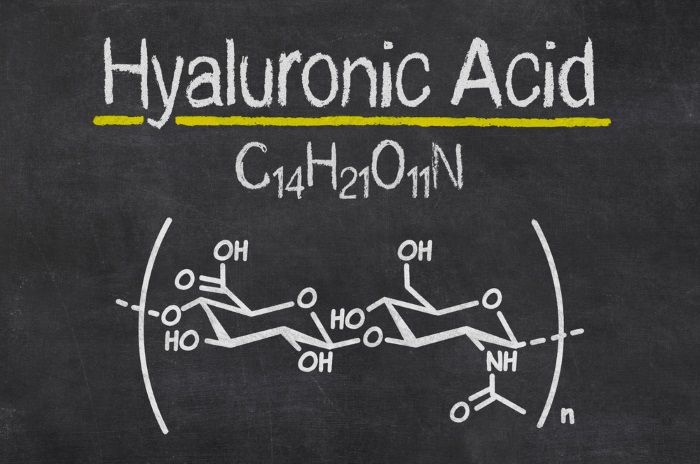It’s one of the ‘big ones’ in the anti-aging market.
Hailed as a fountain of youth, and a staple ingredient in many skincare products.
But, if you read around online you’ll find conflicting information about the benefits of hyaluronic acid for skin.
So, what’s the truth?
Does the reality match the hype? Or is it just another fad designed to extract money from an unknowing public?
In this article, I’ll show you all the helpful things it can do for your skin. And how you can use it to turn back the hands of time.
What Is Hyaluronic Acid?

Hyaluronic acid (HA), also called hyaluronan, is found naturally in your body.
It’s very important because it attracts and binds water molecules.
It belongs to a group of naturally occurring polysaccharides (large sugar molecules) known as glycosaminoglycans.
And its ability to hold water is greater than any other synthetic or natural polymer. Just 1 gram can hold as much as 6 liters.
Why does this matter?
Because this enables it to hydrate tissues and act as a cushioning agent.
But there’s a problem.
As you get older, your body produces less hyaluronic acid.
Unfortunately, by the time you’re in your mid 40’s your production of HA will have reduced by about half.
This starts to cause problems that are particularly visible on your skin.
But, there’s something you can do about it.
Scientific studies have shown that increasing the levels of HA in the skin can have a big effect.
Three common ways to increase HA levels are:
- Oral supplementation
- Creams and serums
- Injectable fillers
Let’s take a deeper look at the benefits of using it on your skin.
Hyaluronic Acid Benefits For Your Skin

Hyaluronic acid has a number of important functions in your skin.
And our understanding of the uses of this amazing anti-aging molecule is ever-growing.
These are the benefits that are currently backed by science:
Moisturizing
One of the biggest benefits of HA for the skin is the essential role it plays in keeping it moisturized.
Its ability to bind to and hold up to 1000 times its own weight in water is responsible for keeping your skin well hydrated, firm, plump, and youthful looking.
The most popular way to increase the amount your skin contains is by using a cream or serum. Thereby increasing your skin’s moisture content with regular use.
Improve Skin Elasticity
One of the hallmarks of youthful skin is its suppleness and elasticity.
This is directly related to its moisture content.
The elasticity of skin can be measured with a cutometer. And scientists have proved that applying HA to the skin produces a measurable increase in skin elasticity (1).
Reduces Lines And Wrinkles
Most people who use hyaluronic acid do it for the anti-aging benefits that are widely advertised.
But, does it really work to turn back the hands of time?
Scientific testing on volunteers has proved that yes, it really does work to fight the visible signs of aging. Reducing lines and wrinkles.
In one study, 33 middle-aged women used a topical nano-hyaluronic acid serum for a period of 8 weeks. The results showed a significant decrease in the depth of wrinkles in the time period (as much as 40%) (2).
This process might be helped by HA’s ability to stimulate the production of collagen in the skin.
Improves Skin Roughness
Do you have a problem with rough skin?
If so, topical hyaluronic acid could be the answer you’re looking for.
Studies have shown that applying hyaluronic acid significantly decreases the roughness of the skin structure after 15 days of treatment (3).
Heals Cuts, Scratches, And Burns
Hyaluronic acid has an essential role in the regrowth of skin wounds.
When it’s applied to the skin it accelerates the rate at which the wound heals.
Scientific studies have shown its beneficial effects in long term wounds and fresh injuries (4).
It’s often used in the treatment of burns, where it has proven to be highly effective.
Treats Skin Ulcers And Bed Sores
Hyaluronic acid has proven to be effective as a treatment for skin ulcers and bed sores (5).
This is due to the tissue regeneration that it stimulates, similar to its action in treating wounds.
Antioxidant And Free Radical Scavenger
This is another useful aspect of its anti-aging powers.
Hyaluronic acid offers some protection against the damaging effects of ultraviolet radiation.
It can neutralize the free radicals created during sun exposure that cause damage to proteins, lipids, and DNA in the skin.
This damage eventually shows itself on the skin as lines, wrinkles, roughness, and sagging.
But, while it has a beneficial effect, topical HA is no replacement for sunscreen.
Improves Acne Scarring
Facial scarring is a curse that continues to plague many people long after they have recovered from acne.
Studies into the use of hyaluronic acid as a treatment have produced very encouraging results.
When injected as a dermal filler, it creates an immediate improvement in depressed acne scars in people with moderate to severe scarring.
Treats Dermatitis
Due to its anti-inflammatory effects, hyaluronic acid creams and serums can be effective in treating dermatitis.
They make a useful alternative to steroid creams, because in comparison they have very few side effects, and are easily tolerated.
In one study using a low molecular weight HA gel, 15 patients with seborrheic facial dermatitis were examined over an 8 week period. The results showed a significant improvement in the condition (6).
Treats Rosacea
Another use of the anti-inflammatory properties of hyaluronic acid is in the treatment of rosacea.
In one study, patients with mild to moderate rosacea were given a 0.2% HA cream for two months with a measurable reduction in the condition over the period.
These results proved the effectiveness of HA for treating rosacea (7).
Final Thoughts
So is it worth your while using hyaluronic acid on your skin?
If you want to regain more youthful looking skin, then the answer is YES!
All the scientific research points to HA being one of the most important and effective anti-aging treatments on the market today.
But, to keep the benefits that it gives you takes a commitment to long term use.
It’s an unfortunate fact that the levels of HA produced by the body quickly diminish as we age.
But at least we now have ways we can replace it.
The most popular method is by using a cream or serum.
Often you’ll see it listed in the ingredients as sodium hyaluronate. This is a salt derivative that’s more easily absorbed.
It really is a true beauty essential to keep skin looking young and healthy.
Have you seen any benefits of hyaluronic acid for skin? Let us know your tips in the comments below!
Related Posts:


This is very informative! I would like to give this a try to help treat my acne scars. This might be the one I’m looking for.